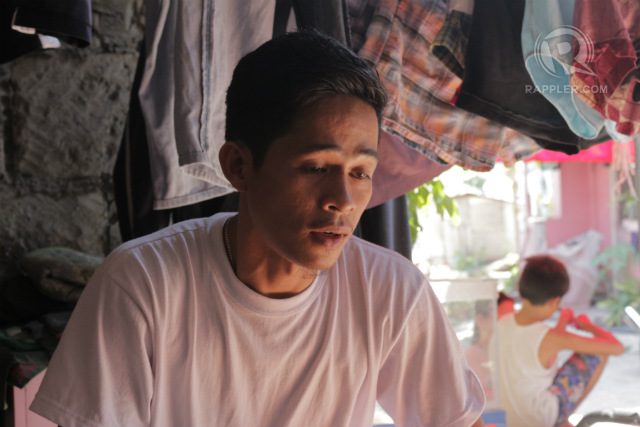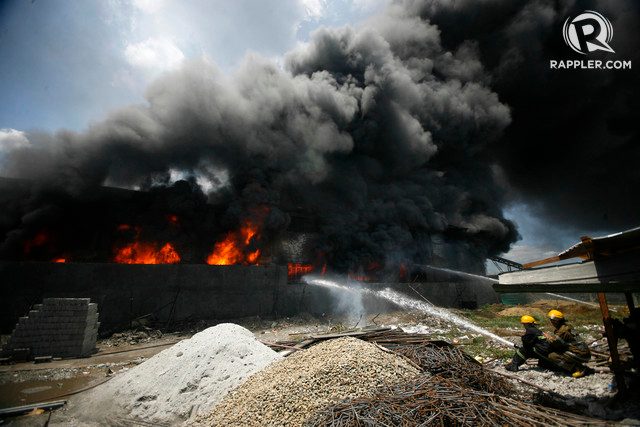SUMMARY
This is AI generated summarization, which may have errors. For context, always refer to the full article.

MANILA, Philippines – Twenty-five-year-old widower Marlou Agunos wants nothing short of incarceration for the owners of local slipper maker Kentex Manufacturing, whose two-storey factory in Valenzuela caught fire on May 13.
Agunos’ wife Joanna was one of at least 72 workers who died in the blaze, trapped inside the factory as the fire raged for hours.
Eufracia Taylor, Asia analyst at the international risk consultancy firm Verisk Maplecroft, regarded the incident as “a significant setback to the reputation of the Philippine manufacturing sector, which has fought hard to compete with its regional peers.”
Factories line up the area in the village of Ugong in Valenzuela where the Kentex factory is located. Villagers in their household clothes and in slippers congregate in front of tall gates to enter sweatshops they work at as low-wage earners.
Taylor said the deadly Valenzuala factory fire is “a blow to the Aquino administration, which has prided itself on improving workplace conditions and prioritizing compliance with labor standards.”
“The factory fire reflects the prevalence of poor occupational health and safety standards in the Philippines, which have struggled to improve against the backdrop of restrictive budgets in the government departments responsible for ensuring compliance,” she said.
The Maplecroft executive explained that workers “have endured the costs of the country’s rapid development – particularly in regard to broadening economic disparities – while the benefits have been largely confined to the business elite.”
Verisk Maplecroft is a global risk and strategy consulting company catering to mutinational companies.
‘Criminalize violations’
Labor Secretary Rosalinda Baldoz on Monday, May 18, renewed her call for the criminalization of occupational safety and health (OSH) violations, which would require amending the 1974 Labor Code.
“Our approach to modernize the Labor Code is to advocate for priority legislation. OSH is one of the priorities,” said Baldoz.
“I could not overemphasize its importance – and the timeliness of our plea to our lawmakers – in the light of accidents in our workplaces, some of which have injured and claimed the lives of our workers,” she added.
Baldoz had issued a similar call after the partial collapse of a Bulacan warehouse under construction claimed 12 lives including two minors and a pregnant woman on January 19. (READ: Builder of collapsed warehouse flouts labor rules)
She urged Congress to enact a law with heavy penalties for violators of the country’s health and safety laws, as the Labor Code does not provide criminal penalty for such non-compliance with some safety and health regulations.
Militant labor group Kilusang Mayo Uno (KMU) also reiterated calls to criminalize grave and fatal violations of occupational health and safety standards after a Taguig construction site accident killed two and injured at least 11 others last February 4. (READ: DOLE stresses construction safety after BGC building mishap)

Surprise visits in Valenzuela factories
Meanwhile, labor coalition Nagkaisa on Monday urged the labor department to “establish a tripartite ‘Task Force Valenzuela’ (TFV) to undertake a surprise sweep and unannounced inspection of factories and plants” in Valenzuela.
“This proposed crackdown in Valenzuela will have national resonance and will hopefully, by making an example of those who will be caught, ensure that labor standard compliance will be honored more in the practice, rather than in its breach,” the group said in a statement.
Nagkaisa boasts of some 49 labor federations and workers organizations within its umbrella.
The group had slammed the Department of Labor and Employment (DOLE) Labor Laws Compliance System (LLCS), which it said is a system tantamount to “relying on the mere ‘say-so’ of a very self-interested employer and factory owner.”
Labor Laws Compliance System
The LLCS began in August 2013 to reform DOLE’s previous labor inspection system, seen by employers as more punitive.
Before the LLCS, the DOLE was implementing the Labor Standards Enforcement Framework (LSEF), which DOLE admitted was “heavy on enforcement.”
Inspection, self-assessment, and technical advisory visits by labor inspectors were the primary mechanisms for compliance enforcement, “with establishments given only 10 days to comply.”
The shift from LSEF to LLCS in 2013 was prompted by a 2009 International Labor Organization report that said the labor inspection system had no major impact on labor laws compliance.
There were only 193 labor inspectors for 784,000 companies then, with the inspection of an establishment done once in 16 years.
“When we recruited officers for the 372 positions the President gave us, we specifically called them Labor Laws Compliance Officers (LLCOs) to stress the developmental approach of the new system,” Baldoz had explained of the LLCS.
Presently, there are 574 LLCOs under the LLCS across the country who replaced the labor inspectors under the LSEF.
They are “tasked to conduct joint assessment, compliance visit, occupational safety and health standards investigation, technical safety inspection, and special assessment or visit of establishments, help propagate a culture of voluntary compliance by informing all establishments and workplaces of labor standards as well as DOLE programs and services.”
Their services are free for the business owners. Companies can also opt for voluntary assessment to gain a Certificate of Compliance (COC).
Labor violations
But the fatal Valenzuela fire had prompted many groups to question the effectiveness of the LLCS.
Under the LLCS, Kentex was able to secure a COC in September 2014 despite violations cited this early into the probe by both government and civil society organizations.
A fact-finding team composed of KMU, the Institute for Occupational Health and Safety Development, the Center for Trade Union and Human Rights, and the Ecumenical Institute for Labor Education and Research reported that Kentex mishandled and mislabelled chemicals and did not provide fire alarm systems and training for its workers.
The government also found that the factory owners entered a deal with an unregistered subcontractor in hiring some of its workers, a violation of DOLE Department Order (DO) 18-A.
Under DO 18-A, both the principal – in this case Kentex – and the subcontractor would be liable for any labor laws violations against the hired workers.
Baldoz warned against fly-by-night subcontractors, explaining that subcontractors are required to have a P3-million paid-up capital under DO 18-A.
Workers interviewed by Rappler also attested to the pakyawan system, where a handler is tapped by the owner to recruit factory workers without the necessary job contract and consequently without law-mandated workers’ benefits.
Marlou Agunos himself said his wife Joanna had not been guaranteed Social Security System and PhilHealth benefits, holiday pay, 13th month pay, overtime pay, and other allowances outlined in the Labor Code despite her 8 years of work with Kentex. – Rappler.com
Add a comment
How does this make you feel?
There are no comments yet. Add your comment to start the conversation.